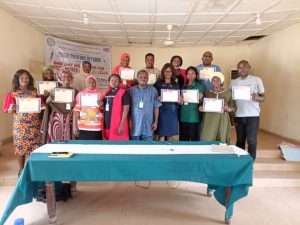
Despite pleas and calls for people to get vaccinated, the Niger state government has disclosed that it still has 38,940 doses of the vaccine available in the state, since the commencement of the exercise.
The reason, according to the State Immunization Officer, Abubakar Usman Kpantu was due to the refusal of the vaccine among the target groups.
It was gathered that 34,220 clients has so far been immunized with the COVID-19 vaccine.
The Immunization Officer made this disclosure in Minna at a one day Workshop for Journalists organized by the Technology and Development Research Network (TEDREN) FUT Minna and Media Mentors Network in Minna, Niger state.
According to Kpantu, “the state had received a total of 74,110 doses of AstraZeneca vaccine targetting 65,228 clients which represent one per cent of the state total population of 6,522,777.
“There is the refusal of the vaccine among the target groups for phase 1, “even among the health workers, some are still scared of taking the vaccine. We are facing refusal of the vaccine in the state”.
The State Immunization Officer further said that there have not been any serious adverse effect of the vaccine reported in the state or any of the local government areas where the vaccines have been administered.
He added that the state has inadequate vaccination teams to cover some of the populated areas adding that there are 146 teams in the state which are not enough to cover all the populated areas.
“We have 146 vaccination teams and they cannot cover all the areas because some local government areas are given a minimum of four teams and a maximum of eight teams which are still not enough. We need more vaccination teams.”
He then appealed to the media to do more in terms of creating awareness about the vaccine stressing that many people do not know about the vaccine which is increasing the level of misinformation about the vaccine in the state.
“We did not collect the vaccine to keep it in the state, we collected it for use and the people, especially the frontline workers need to know that there is a vaccine for them to take. To do that, we need you, the media. You are the one that will help us to sell the commodity. We need more reportage about COVID-19 vaccine in the state”, he stated.
The Coordinator, Technology and Development Research Network (TEDREN), Federal University of Technology, Minna, Professor Nicholas Iwokwagh said that Journalists are needed because they are critical in maintaining vaccine confidence in Niger State.
Taking the participants on the ‘Essentials of vaccine reporting’, Iwokwagh noted that it is important for Journalists to understand the dynamics of reporting vaccines to keep society well informed stating that this would also help in preventing panic in the society and enable the public to make informed decisions.
“This topic is important because it discusses the strategies that media professionals can adapt to give accurate reports to the society on vaccines.
“This Workshop attempted to equip journalists and media professionals with the knowledge and skills required to report vaccines accurately. It discusses the practical and positive steps that journalists and media practitioners should take in reporting vaccines to play their roles effectively.”
He further noted that the media are powerful resources that affect and control disease outcomes in several ways.
In her presentation on Communicating Facts about Vaccines, Data/Investigative Journalist, Justina Asishana observed that people are already showing some hesitancy to the COVID-19 Vaccine stressing that It is important for journalists to shed light on the issue and educate the public about it.
“To do this, it is important to communicate the facts about the COVID-19 vaccines”, she stated.
Asishana who gave various tips on Communicating Facts about Vaccines stated that Journalists are key in tackling the reluctance of people towards vaccine stating that by reporting facts and figures about the effectiveness of vaccines, it would go a long way in ending epidemics throughout history


















